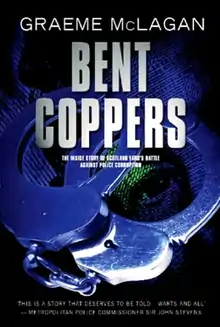Bent Coppers
Bent Coppers: The Inside Story of Scotland Yard's Battle Against Police Corruption is a non-fiction book by award-winning British journalist Graeme McLagan. First published in the United Kingdom in 2003 by Orion Publishing Group, the book examines police corruption within the Metropolitan Police Service and South Eastern Regional Crime Squad—with particular focus on the 1990s and early 2000s—and the establishment and activities of the force's anti-corruption "Ghost Squad".[1] Its publication led to a 4-year legal case resulting in a landmark ruling in English defamation law.[2][3]
 Cover of the first edition | |
| Author | Graeme McLagan |
|---|---|
| Country | United Kingdom |
| Language | English |
| Subject | Corruption within the Metropolitan Police |
| Genre | Non-fiction |
| Publisher | Orion Publishing Group |
Publication date | 2003 |
| Media type | Print (hardcover and paperback) |
| Pages |
|
| ISBN | 9780297830931 |
| OCLC | 936505407 |
Libel case
Following publication, McLagan and Orion were sued for libel by Michael Charman, a former detective constable with the Flying Squad who had been "required to resign" from the Metropolitan Police for "discreditable conduct".[4][5] Charman alleged that the book libelled him by "suggesting that there were 'cogent grounds' of suspecting him of being involved in corruption." In seeking to have Charman's claim for damages dismissed, the author and publisher cited the "Reynolds defence" of qualified privilege, which protected publication of an allegation if it was made in the public interest and satisfied the test of responsible journalism.[6][7]
In June 2006, at the High Court of Justice of England and Wales, Mr Justice Grey ruled that the book "did not pass all the necessary tests of "responsible journalism" and was not entitled to protection" of qualified privilege.[5][7] Following the reaffirmation of the Reynolds defence in Jameel v Wall Street Journal Europe Sprl in October 2006, in which the Law Lords sitting in the House of Lords determined that libel judges in the lower courts had been interpreting the criteria too strictly, McLagan and Orion appealed their case.[5][8] On 11 October 2007, Lord Justice Ward, Lord Justice Sedley and Lord Justice Hooper, sitting in the Court of Appeal of England and Wales, allowed the appeal and dismissed Charman's claim for damages—the first time that the Reynolds defence had succeeded in the publication of a book.[9]
In their ruling, the judges said they were satisfied that the book was a piece of responsible journalism, that McLagan had taken steps to verify the story and that "as a result of his honesty, his expertise on the subject, his careful research and his painstaking evaluation of a mass of material, the book was protected."[3] Caroline Kean, McLagan's solicitor, called the ruling "ground-breaking and momentous", and said: "This is an unambiguous confirmation by the Court of Appeal that Reynolds is alive and kicking. It is not limited to newspapers, it means all media and there is no time constraint. It applies equally to a book and, by analogy, it will apply to a film or a TV programme, providing it is something of proper public interest and a journalist has done his very best to act in the course of responsible journalism."[3]
References
- Palmer, Alasdair (2 July 2003). "When cops are robbers". The Daily Telegraph. London. Retrieved 12 March 2017.
- Douglas, Torin (11 October 2007). "Book author wins historic libel case". BBC News. Retrieved 12 March 2017.
- "Landmark libel victory for 'Bent Coppers' book". Press Gazette. 11 October 2007. Retrieved 12 March 2017.
- Campbell, Duncan (20 June 2006). "Ex-policeman sues publisher for libel". The Guardian. London. Retrieved 18 November 2018.
- McLagan, Graeme (15 October 2007). "Brought to book: Bent Coppers, a book about Scotland Yard's battle against police corruption, led to a four-year libel ordeal for its author". The Guardian. London. Retrieved 18 November 2018.
- Campbell, Duncan (21 June 2006). "Author facing libel claim 'tried to be fair'". The Guardian. London. Retrieved 18 November 2018.
- Campbell, Duncan (19 March 2007). "The future of libel starts here: An appeal court hearing starts today that could have a big impact on crime and current affairs writers". The Guardian. London. Retrieved 18 November 2018.
- Dyer, Clare (12 October 2007). "Landmark libel ruling grants more freedom to journalists". The Guardian. London. Retrieved 12 March 2017.
- "Case is 'victory for journalism'". BBC News. 11 October 2007. Retrieved 12 March 2017.
